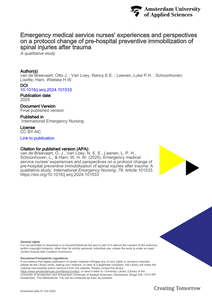A problem in spontaneous dream psi studies is validation of purported psi elements. Dreams rarely have enough specifi city to satisfy critics that they point to paranormal knowledge of a specifi c event. This creates evidential hurdles to overcome when evaluating whether a dream contains psi-derived information such as scenes of future events or physically distant locations. In this study, the goal is to arrive at a reasonable method to establish that information derived from spontaneous dream experiences can be established as veridical. To accomplish this, a method for fi nding the equivalent of a target within a spontaneous experience is used to fi x a specifi c locale and time for comparison. Adverse scoring criteria are used to address complaints about confi rmation bias. The result is a psi-adverse method for scoring spontaneous experiences that are anchored to a specifi c locale and time. This method regularly produced signifi cant p-values when used to assess 20 consecutive dream records, comprising 598 individual line items. These records were taken as a sample from a group of 3,305 dream records made over the past 22 years by the author.
DOCUMENT
ObjectiveIn 2016, a selective preventive spinal immobilization protocol for emergency medical service (EMS) nurses was introduced in the Netherlands. This protocol leaves more room for autonomous decision-making in the pre-hospital phase regarding preventive spinal immobilization (PSI), compared to the previous strict protocol. In this study, we explored the experiences and perspectives of EMS nurses on decisionmaking about PSI after the change from a strict to a selective PSI protocol. Methods: We used a qualitative design with semi-structured face-to-face interviews. Thematic analysis was applied. The capability-opportunity-motivation-behavior-model was used to interpret the experiences and perspectives. Results: Thirteen EMS nurses from three emergency medical services were interviewed. Respondents appreciated autonomous decision-making as there was more room for patient-centered informed decision-making. However, autonomous decision-making required optimized knowledge and skills and elicited the need to receive feedback on their decision not to apply PSI. When nurses anticipated resistance to selective PSI from receiving hospitals, they were doubtful to apply it. Conclusion: Nurses appreciate the increased autonomy in decision-making, encouraging them to focus on patient-centered care. Increased autonomy also places higher demands on knowledge and skills, calling for training and feedback. Anticipated resistance to receiving hospitals based on mutual protocol discrepancies could lead to PSI application by EMS nurses while not deemed necessary. Recommendations: To enhance PSI procedures, optimizing the knowledge and skills of EMS nurses that facilitate on-scene decision-making may be indicated. A learning loop for feedback between the EMS nurses and the involved hospitals may add to their professional performance. More efforts are needed to create support for the changed Emergency Medical Services strategy in PSI to prevent unnecessary PSI and practice variation.
DOCUMENT

Background: A new selective preventive spinal immobilization (PSI) protocol was introduced in the Netherlands. This may have led to an increase in non-immobilized spinal fractures (NISFs) and consequently adverse patient outcomes. Aim: A pilot study was conducted to describe the adverse patient outcomes in NISF of the PSI protocol change and assess the feasibility of a larger effect study. Methods: Retrospective comparative cohort pilot study including records of trauma patients with a presumed spinal injury who were presented at the emergency department of a level 2 trauma center by the emergency medical service (EMS). The pre-period 2013-2014 (strict PSI protocol), was compared to the post-period 2017-2018 (selective PSI protocol). Primary outcomes were the percentage of records with a NISF who had an adverse patient outcome such as neurological injuries and mortality before and after the protocol change. Secondary outcomes were the sample size calculation for a larger study and the feasibility of data collection. Results: 1,147 records were included; 442 pre-period, and 705 post-period. The NISF-prevalence was 10% (95% CI 7-16, n = 19) and 8% (95% CI 6-11, n = 33), respectively. In both periods, no neurological injuries or mortality due to NISF were found, by which calculating a sample size is impossible. Data collection showed to be feasible. Conclusions: No neurological injuries or mortality due to NISF were found in a strict and a selective PSI protocol. Therefore, a larger study is discouraged. Future studies should focus on which patients really profit from PSI and which patients do not.
DOCUMENT

Wat versterkt de beroepsidentiteit van de zorgprofessional?To be continued.Het verbeteren van de vorming van de professionele identiteit (PI) en interprofessionele identiteit (IPI) van zorgprofessionals door onderwijs, bij- en nascholing.
Ervaringsdeskundigheid in de zorg is sterk in opmars: hulpverleners die hun eigen persoonlijke ervaringen professioneel inzetten bij het herstel van hun cliënten. Onder andere beroeps-en gedragscodes en negatieve beeldvorming staan de optimale inzet hiervan in de weg. Dit promotieonderzoek wil de professionele inzet van ervaringsdeskundigheid in de geestelijke gezondheidszorg (GGZ) onderzoeken en verstevigen.Doel Dit promotieonderzoek heeft als doel om de professionele inzet van ervaringsdeskundigheid in de GGZ te onderzoeken en te verstevigen. Ervaringsdeskundigen hebben vaak creatieve oplossingen, zijn in staat om vanuit hun eigen ervaring aan te moedigen en kunnen helpen het stigma op psychische problemen te verminderen. Dit onderzoek gaat in op relationeel-ethische verschuivingen die plaatsvinden bij de implementatie van ervaringsdeskundigheid en de betekenis van die inkleuring. Het onderzoek wil een bijdrage te leveren aan zowel theorievorming, de waarde van ervaringsdeskundigheid en in het bijzonder een versteviging en verduurzaming daarvan binnen de (ggz) praktijk- en beroepsinnovatie. Een ander doel van het onderzoek is om de opleidingen Social Work te verrijken met nieuwe kennis over ervaringsdeskundigheid. Resultaten Dit onderzoek is een vervolg op eerder onderzoek, waarin we de ervaringsdeskundigheid onder zorgprofessionals onderzochten. Daaruit kwam een aantal interessante inzichten. 45% van de ondervraagde zorgprofessionals bleek zelf ervaring te hebben met de ggz. Zij gaven aan die te willen inzetten in hun werk, maar wisten niet altijd hoe ze hun persoonlijke ervaringen konden combineren met hun professionele rol. Cliënten reageerden over het algemeen goed op hulpverleners die hun eigen ervaring meenamen in de zorg. Maar in de organisaties is nog veel onwetendheid over deze nieuwe rol, met name onder regiebehandelaren (psychiaters en psychologen). In mei '22 vond het jaarlijkse congres plaats van de Nederlandse Vereniging voor Psychiatrie. De poster over het gebruik van ervaringskennis in de rol van psychiater won een aanmoedigingsprijs. Use of experiential knowledge by mental health professionals and its contribution to recovery: literature review Professionals harnessing experiential knowledge in Dutch mental health settings Lees meer over onze tussentijdse bevindingen in het artikel Ervaringskennis professionals draagt bij aan betere geestelijke gezondheidszorg Posterpresentatie ‘Resultaten voorstudie ervaringskennis onder zorgprofessionals’. Luister onderstaande aflevering uit de podcastserie Lessen uit #HUonderzoek met Simona Karbouniaris (ook te vinden via je favoriete podcastapp). Looptijd 01 maart 2019 - 01 maart 2023 Aanpak Hoewel veel zorgorganisaties moeten wennen aan het idee dat ook reeds werkende zorgprofessionals ervaringsdeskundig kunnen zijn en zich als zodanig profileren, is een groeiend aantal professionals met ervaringsdeskundigheid aan het werk. Deze zorgprofessionals hebben behoefte aan verdere validering van hun nieuwe rol, kennis en praktische handvatten teneinde hun ervaringsdeskundigheid adequaat te kunnen benutten. Dit wetenschappelijk onderzoek bestaat uit een literatuurstudie en een praktijkdeel. Er vindt kwalitatief participatief onderzoek plaats op drie niveaus in de organisatie: onder professionals met ervaringskennis en hun collega's; bij cliënten; bij de 3 participerende organisaties.
Ervaringsdeskundigheid in de zorg is sterk in opmars: hulpverleners die hun eigen persoonlijke ervaringen professioneel inzetten bij het herstel van hun cliënten. Onder andere beroeps-en gedragscodes en negatieve beeldvorming staan de optimale inzet hiervan in de weg. Dit promotieonderzoek wil de professionele inzet van ervaringsdeskundigheid in de geestelijke gezondheidszorg (GGZ) onderzoeken en verstevigen.
